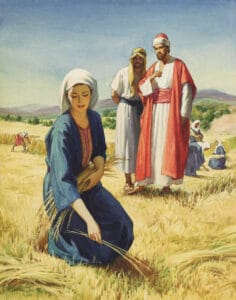Daily Lesson for Monday 9th of June 2025
Naomi asked that her name be changed to Mara because of the bitterness that had fallen over her life (see Ruth 1:20). Our relationship with our Creator has been irreparably damaged by sin, forcing us into spiritual poverty. Our prospects are dim, and we spend our lives gleaning what we can from the edges of the field, living on the scraps of joy that can still be found in a broken world. But it all changes the moment we make a remarkable discovery: God has not forgotten us.
Read Ruth 2:5-20. Why is this such a pivotal moment in the story? Why do you think Naomi’s discovery of the benefactor’s identity was such good news?
Naomi could not take possession of her husband Elimelech’s land without obtaining assistance from her husband’s family. She hopes that Ruth can marry a close relative of her deceased husband and bear a child in Elimelech’s name. God had made provision in Israel for individuals to reclaim their inheritance in the Promised Land: a close relative was needed to redeem Elimelech’s inheritance. Boaz was not just a kind farmer; he was a kinsman of Elimelech who could redeem the land.
The discovery that Boaz was not only kindhearted and generous but a relative was the best possible news: the poverty in which these two women existed did not have to last forever.
Christians have long understood Boaz to be a type of Christ, who is not only our Creator but chose to become our kinsman—a real, flesh-and-blood human being, one of the reasons why, again and again, He called Himself “the Son of man” (Matthew 12:8, Mark 8:31, Luke 22:22, John 3:14).
Far too many people think of God in harsh terms—e.g., “Perhaps He will let us into heaven if we check all the correct boxes on a moral inventory, but He will do so grudgingly because we have scraped by on a technicality.” The picture of Christ revealed in Boaz completely displaces such notions. God not only notices us, but, in spite of our deep spiritual poverty, He wants us as His bride.
|
Try to wrap your mind around not only the Creator’s becoming part of His own creation but then dying for it. How should this astonishing truth impact how we view our own existence? |
 (0)
(0)



